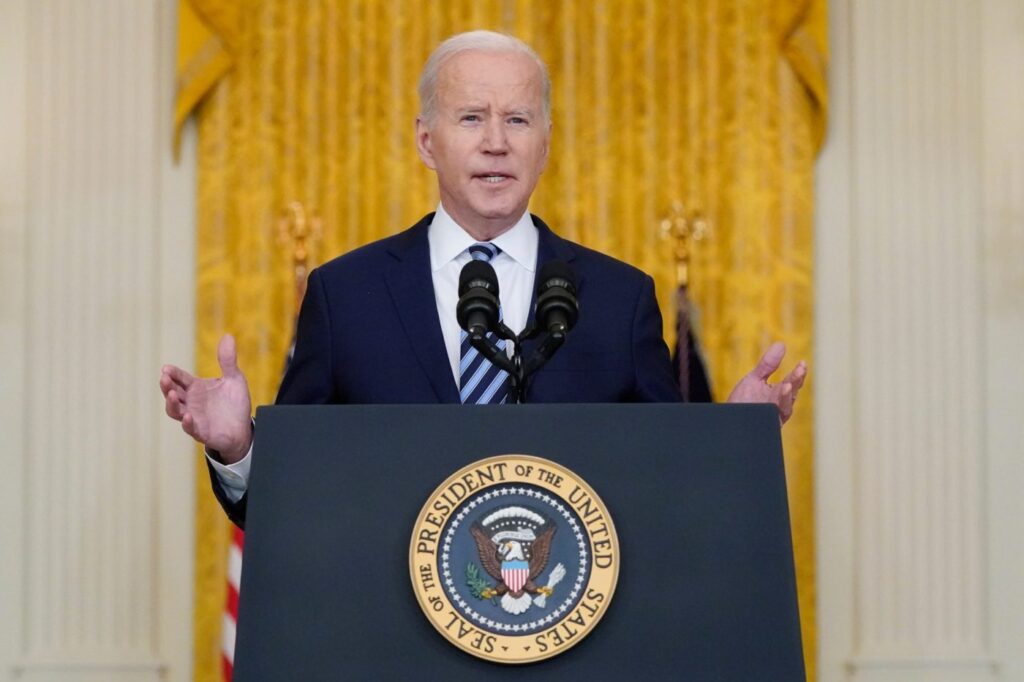
On Saturday, the European Union, the United Kingdom, and the United States agreed to cut off several Russian banks from SWIFT, the Society for Worldwide Interbank Financial Telecommunication.
Calls continue to extend the ban to all Russian banks. That has been referred to as the last, most devastating of all sanctions. We need to be careful, however, lest the potential for devastation turn out to be to the United States.
SWIFT is an association of private banks, headquartered in Belgium. Its function is to provide the communication system between over 10,000 banks worldwide. America has, in the past, convinced the member banks to use SWIFT as a diplomatic tool — most notably, in 2012 as a way of pressuring Iran over its nuclear program.
Saturday’s announcement was to do the same for Russia’s top 10 commercial banks.
This step, however, and going beyond those 10 to cut off all of Russia’s financial sector from SWIFT, could hasten an economic catastrophe in America, with no additional pressure on Russia.
The Russian Central Bank has already been sanctioned: it cannot draw on its assets anywhere outside of Russia. It is doubtful any additional pressure will result from cutting off SWIFT for all Russian banks.
If we deny SWIFT to Russian banks whether complicit with their government or not, a nascent movement away from the U.S. dollar as the international currency would be accelerated.
The danger is that private banks in other large economies in the world would be incentivized to develop an alternative system for inter-bank communication that would not be susceptible to America’s pressure.
Remember SWIFT is a private institution, driven by commercial banks’ sense of their own self-interest. Being blocked because of the wrong-doing of their host government is a new risk these member banks would prefer to avoid.
The greatest vulnerability to America’s economic system is our national debt: $30 trillion, more than one quarter greater than the annual production of all goods and services in America. Of that amount, $7 trillion is held by foreign countries and investors. Over $1 trillion is held by China. If foreign holders of U.S. debt chose to switch out of U.S. bonds into bonds denominated in other currencies, the U.S. economy would collapse.
Unable to finance our deficit spending with foreign money, the Treasury would have to increase interest rates massively to induce American investors to pick up the slack on existing debt, not to mention the annual increase in borrowing of about $3 trillion dollars, due to government budget deficits.
The United States has been able to run annual deficits of this size because foreign investors are willing to buy dollar-denominated bonds. The dollar is the safest currency in the world – today. The British pound used to be the world’s safest investment. After World War II, the dollar eclipsed the pound and Britain’s economy came under severe strain. As the pound weakened, the threat of foreign countries dumping the pound became more realistic and with that, Britain’s susceptibility to international blackmail. The United States itself practiced some of that blackmail, forcing Britain to withdraw its troops from the Suez Canal in 1956 when President Eisenhower threatened to dump British bonds if Britain didn’t withdraw.
Related Articles
California faces a ‘big short’ in vital commodities
Newsom and Hertzberg are fighting a losing battle with SCOTUS
Trump and his favorite czar, V. Putin
Government-funded pre-school isn’t as effective as some hope
Democrats are headed for electoral Armageddon in November
SWIFT transfers are currently denominated in dollars. If, in the wake of the expulsion of all Russian banks from SWIFT, foreign banks turn to an alternative communication system for the daily transfer of the $5 trillion currently handled by SWIFT, the new system won’t use dollars as the currency of account.
Foreign banks hold their assets in the currency used in inter-bank accounting. If that’s no longer dollars, an avalanche away from US bonds will commence. The currency of China, the world’s second largest economy, would be an obvious alternative choice. The renminbi is not fully convertible on international exchanges; but if the possibility of it becoming the international currency appears real, China will rush to embrace it.
Tom Campbell is a professor of economics and a professor of law at Chapman University. He served five terms in the U.S. Congress, including on the banking and financial services committee, and the international relations committee.
